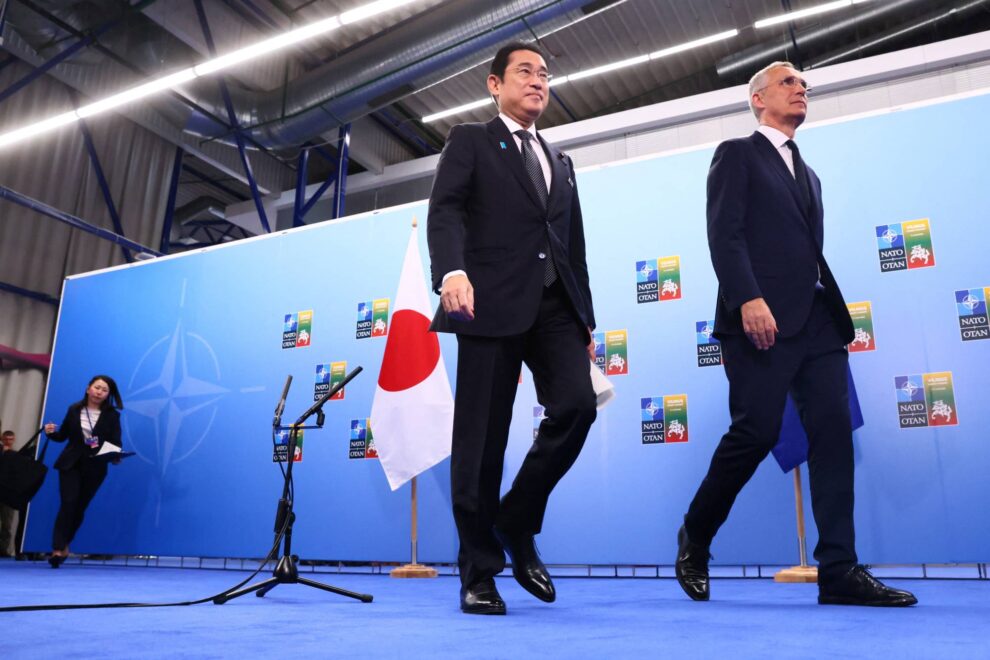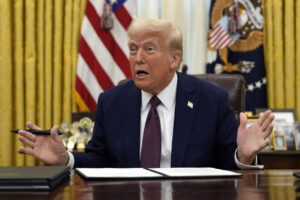Japan and NATO have ushered in a new era in bilateral relations with the completion of a deal that will see Tokyo step up cooperation with the world’s most powerful military alliance in several additional areas, amid shared concerns over Russia and China.
Collaboration will go beyond traditional security areas and extend to cyber, emerging and disruptive technologies and strategic communications, Prime Minister Fumio Kishida said Wednesday at a NATO leaders’ summit in Vilnius, Lithuania, about Japan’s recently agreed deal with the trans-Atlantic alliance, called the Individually Tailored Partnership Program (ITPP).
In short remarks made alongside NATO Secretary-General Jens Stoltenberg, Kishida said the new deal comes not only in response to an increasingly severe international security environment but also in recognition that the security of Europe and the Indo-Pacific are “inseparable.”
“Japan and NATO share the understanding that unilateral attempts to change the status quo by force or coercion will not be tolerated, regardless of where they occur in the world,” Kishida said.
Stoltenberg, who praised Japan for being NATO’s closest partner country, thanked Tokyo for its support for Ukraine while expressing concern about China’s “heavy military buildup” and the expansion of its nuclear forces.
The NATO chief also condemned North Korea’s nuclear and missile programs as violations of U.N. Security Council resolutions after Pyongyang fired off what Japan said was a suspected intercontinental ballistic missile earlier in the day.
But neither Kishida nor Stoltenberg made any mention of plans to open a NATO liaison office in Tokyo, amid staunch resistance from France.
Paris has reportedly rejected the move as “a matter of principle,” arguing that such geographical expansion would risk shifting the alliance’s remit too far from its original North Atlantic focus.
The two-day NATO summit, which was set to wrap up Wednesday, marked the second time Kishida had participated in the gathering.
Three other Indo-Pacific leaders — Australian Prime Minister Anthony Albanese, New Zealand Prime Minister Chris Hipkins and South Korean President Yoon Suk-yeol — also joined the event.

Yoon on Tuesday also unveiled Seoul’s version of its ITPP deal with NATO.
Informally known as the Indo-Pacific Four (IP4), all of these countries, which have been part of NATO’s “global partners” grouping since the early 2010s, are transitioning to ITPPs to both expand and institutionalize cooperation with the alliance, particularly in areas of global concern.
Following Kishida’s remarks, the North Atlantic Council – NATO’s principal political decision-making body – held a special session with the four IP4 leaders to iron out the details of future cooperation.
Stoltenberg introduced the session by emphasizing that what happens in the Indo-Pacific matters to the Euro-Atlantic.
“The war in Ukraine has global ramifications,” he said. “Terrorist and cyberthreats know no borders and authoritarian regimes are coming closer together. So, we must stand together for the rules-based international order.”
Japan, one of the alliance’s oldest partners, has arguably been the most pro-NATO of the IP4 countries.
With the ITPP, the hope now is that the new deal will give more focus and commitment to collaboration, especially in the context of a changing strategic outlook as well as Japan’s recent dramatic shifts in its defense and security policy, said Gorana Grgic, a senior lecturer at the Department of Government and International Relations and the United States Studies Center at the University of Sydney.
Japan, which has an ambassador to NATO, has been interacting for years with the alliance — mainly through joint exercises with member states, in addition to U.S. forces — most notably in the form of maritime and cybersecurity drills.
In this context, the new cooperation program, which encompasses a total of 16 collaboration areas — including space security, climate change and countering disinformation — indicates that both sides want to take ties to the next level.
The ITPP between NATO and Japan also outlines three strategic objectives for the 2023-26 period, including strengthening dialogue and consultations, enhancing resilience and boosting interoperability.
“This is a crucially important development in that for the first time there is a practical, in-depth pathway exploring where and how the security of the Euro-Atlantic and the Indo-Pacific intersect,” said Alessio Patalano, an East Asia security expert and professor at the Department of War Studies at King’s College London.
“This new focus signals not only a deepening relationship but also that the age of regionalism and globalization is giving way to the age of the Atlantic-Pacific partnership,” he added.
But how can Japan achieve this in practice?
Paal Sigurd Hilde, a NATO expert at the Norwegian Institute for Defense Studies, said that to boost interoperability, Japan would have to start adhering more closely to NATO standards not only in terms of equipment procurement but also military doctrines and procedures. Also critical will be improving personnel exchanges and expanding joint drills.
At the same time, such a move would provide new opportunities for Japan’s struggling defense industry, noted Hilde, arguing that adopting NATO standards could make Japanese-made equipment more attractive for member countries.

It’s important to note that Japan, along with the other three Indo-Pacific partners, is already part of different platforms seeking to address interoperability between the alliance and its partners.
For instance, Grgic points out that Japan has participated for nearly a decade in the bloc’s Interoperability Platform, a standing format intended to increase general interoperability with selected partners.
As for enhancing resilience, analysts say that the best approach is through increased information sharing and closer cooperation in a range of critical fields such as energy security, strategic communications, hybrid warfare, cybersecurity and climate change.
Against this backdrop, these ITPPs are important to NATO as they go beyond the periodic summit consultations with the IP4 and allow it to test not only the opportunities but also the limits of practical cooperation, said Jamie Shea, a former deputy assistant secretary-general for emergency security challenges at NATO.
The advantage for the alliance is that it can gain a great deal from the IP4s technological knowhow and expertise — including on dealing with China — while also counting on their support, for instance, to supply military aid to Ukraine and impose sanctions on Russia.
Furthermore, such cooperation gives NATO a role in the U.S.-led competition with China.
“Washington has long wanted a role for NATO in this as a way to pull its European allies and Canada along,” Hilde said. This is a position that has been supported by Japan.
While NATO says Beijing is not an adversary and calls for continued engagement with China, it slammed Beijing in a joint communique released Tuesday saying that the Asian powerhouse’s “stated ambitions and coercive policies challenge our interests, security and values.”
The alliance also criticized what it called the “deepening strategic partnership” between China and Russia and their “mutually reinforcing attempts to undercut the rules-based international order,” which NATO says “run counter” to its values and interests.
Another key takeaway from the Vilnius summit is that the alliance is gaining a foothold in the Indo-Pacific.
While experts say there will be no permanent presence of NATO assets in the Indo-Pacific, Japan and other IP4 countries are boosting ties with individual NATO member states such as Britain, Germany, France and Italy, all of which have increased deployments to the region.
These developments have raised concerns in Pyongyang, Moscow and Beijing, which has repeatedly warned that such moves will ultimately fuel regional tensions and increase the likelihood of conflict.
Source : The Japan Times










